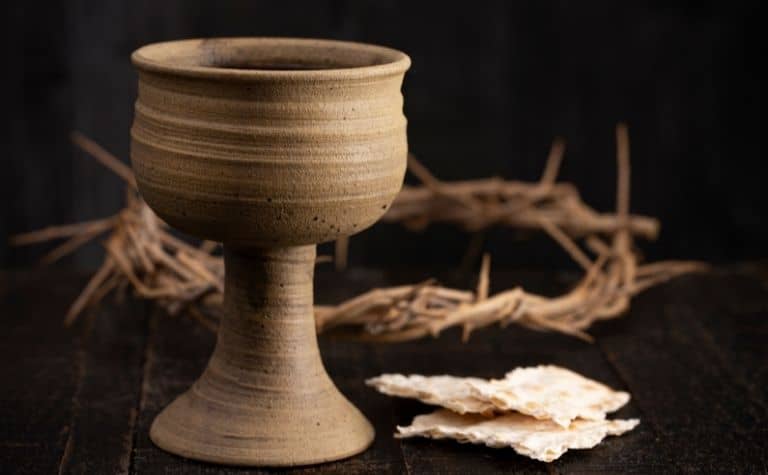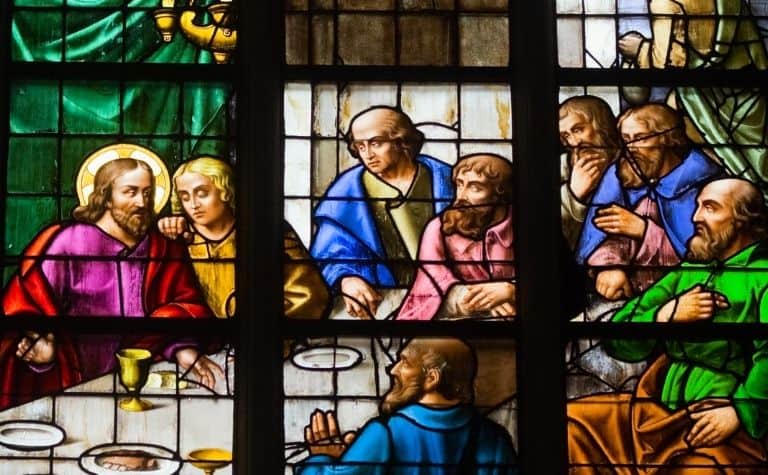The Episcopal Church is one of the historic branches of Protestant Christianity in the Anglican tradition. Episcopalian ecclesiology values the sacraments that Jesus himself instructed people to practice: baptism and the Lord’s Supper or communion. Many people want to know how close Episcopalian beliefs about communion are to Catholicism.
Episcopalians don’t believe in transubstantiation, which is the belief that the bread and cup of the Lord’s Supper become the body and blood of Jesus Christ when consumed. Instead, they believe that Christians partake in the body and blood of Christ in a spiritual and heavenly manner.
What do Episcopalians believe about the bread and cup? Who can and can’t take communion in an Episcopalian church? Can a Catholic receive communion in an Episcopal church? Keep reading to learn the answers to these questions and others.

What Do Episcopalians Believe About the Bread and Cup?
Episcopalians believe that the bread and wine of the communion table operate both as a sign and a sacrament. As a sign, the elements direct a Christian’s heart and mind toward the crucifixion of Jesus.
The crucifixion demonstrates how far God was willing to go to redeem his fallen creation. It also serves as an example for believers to follow. The Christian life is about taking up one’s cross and following Jesus’s example.
Episcopalians also believe that the elements are also a sacrament. This means that the Lord’s Supper is a special way that God dispenses grace into the lives of his people. Those in the Anglican tradition, including Episcopalians, don’t attempt to describe exactly how this works.
This sense of mystery is one of the things that separates a Presbyterian understanding of communion from an Anglican understanding.
Key Beliefs Concerning This Sacrament That Episcopalians Affirm
- First, Episcopalians believe that only those with true faith will receive grace from God. There is nothing inherently life-giving in the elements that would benefit non-believers. A person must receive them in faith, and an unregenerate person is not capable of this.
- Second, Episcopalians maintain that those who receive communion are truly partaking in the body and blood, but only in a heavenly or spiritual manner. They believe in the “real presence” of Christ at communion.
However, they don’t believe, like orthodox Catholics do, that the substance of the bread and wine change into the substance of the body and blood of Jesus Christ. Nor do they argue, like many Lutherans do, that Jesus is present in and around the elements.
They say that the Lord’s Supper is a heavenly and spiritual meal that bestows grace on those that receive it in faith.
Additionally, Episcopalians emphasize that Holy Communion is, for the believer, a place of grace, not a place for condemnation. Nevertheless, one should take the Lord’s Supper lightly. [1] [2]
Also, see What Bible Translations Do Episcopalians Use? to learn more.

Who Can and Can’t Take Communion In an Episcopalian Church?
The Episcopal Church allows all baptized Christians to receive communion. This includes young children. Some Episcopal churches offer communion preparation classes for children as young as first grade.
Do children have to take communion? No. If parents don’t want their children to take communion, then the church offers accommodation. Children may walk up to the altar, kneel before it, and cross their arms over the chest.
Then the priest will say a prayer of blessing, and the children can return to their seats without receiving the elements. This process also applies to adults who, for whatever reason, don’t want to take communion.
What is an example of the order of a communion service? The particular manner in which priests within the Episcopal Church serve communion may vary, but in general, there are certain elements that stay the same.
- Often, a layperson may help out by dismissing the congregation row by row to receive communion.
- Each person kneels on the altar rail and places their hands out to receive the elements.
- The priest then goes along the line of congregants and places a wafer in the hands of each person.
- At this point, each person may eat the bread immediately or wait to dip it into the wine.
- If someone eats the bread right away, then the priest or a helper will offer the cup for the Christian to drink. [3]
Although the Episcopal Church only permits baptized Christians to take communion, this is difficult to enforce. One way of preventing a non-Christian from partaking in communion is through liturgy.
The Book of Common Prayer has several different liturgies for administering communion, but in one version, the priest says, in reference to the elements, “the gifts of God for the people of God.”
If someone new to the church continues to take communion, the priest, if doing his or her clerical duties, will get to know the person on some level.
Through these conversations, the priest may learn whether that individual is a baptized believer or not. What the priest does with that information varies.
Also, see Do Episcopalians Believe in Purgatory? to learn more.

Can a Catholic Receive Communion In an Episcopal Church?
A Catholic wishing to receive communion in an Episcopal church must meet the same qualifications that every person must meet: that person must be a baptized Christian. This means that Catholics need to profess faith in Christ and testify to being baptized.
As discussed above, the practical enforcement is difficult and varies by congregation and priest. Generally speaking, few, if any, Episcopal priests would ask first-time visitors whether they were Christians or not before they gave them the communion bread and wine.
Although a priest of the Episcopal Church would offer communion to a Catholic, it is less clear whether an average Catholic would want to take communion at an Episcopal Church.
The Episcopal Church doesn’t believe in apostolic succession; thus, according to the Catholic Church, there is no one to properly ordain a priest within the Episcopalian tradition.
Because of this, the priest is unable to bless the elements so that transubstantiation can occur. Therefore, at the very least, a Catholic or any Christian would not be receiving the full force of the sacrament at an Episcopalian communion service.
The Catholic may receive little benefit or none at all. Because of this, many Catholic priests would counsel their congregants against consuming the elements at an Episcopal Church.
References:
[1] Source
[2] Source
[3] Source
Related Questions
Episcopalian and Baptist are two of the largest branches of the Christian faith in America, though churches belonging to each tradition can also be found around the world. Many people know that...
Many people have heard of the Episcopalian and Methodist denominations but don't know the differences and similarities between their respective churches. People may also be aware that both traditions...
